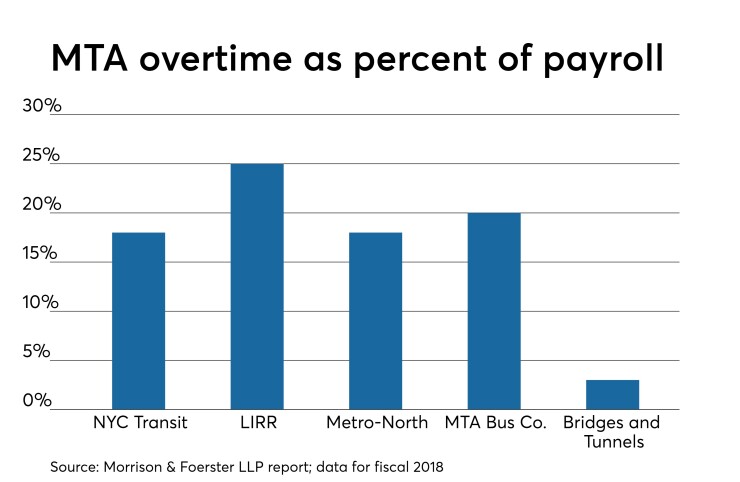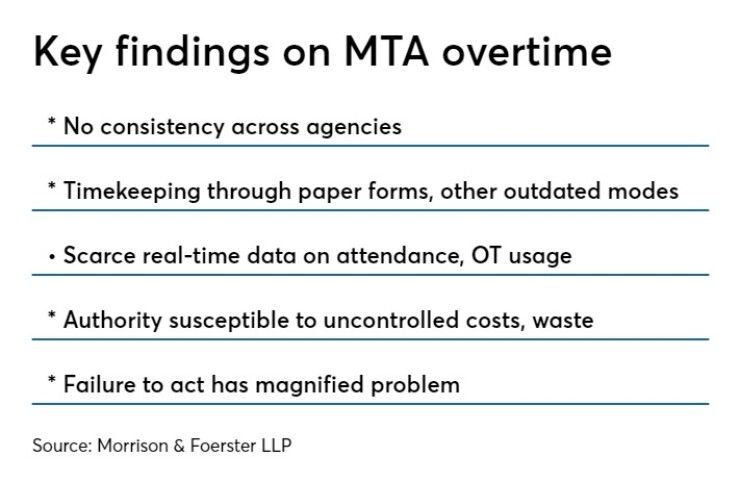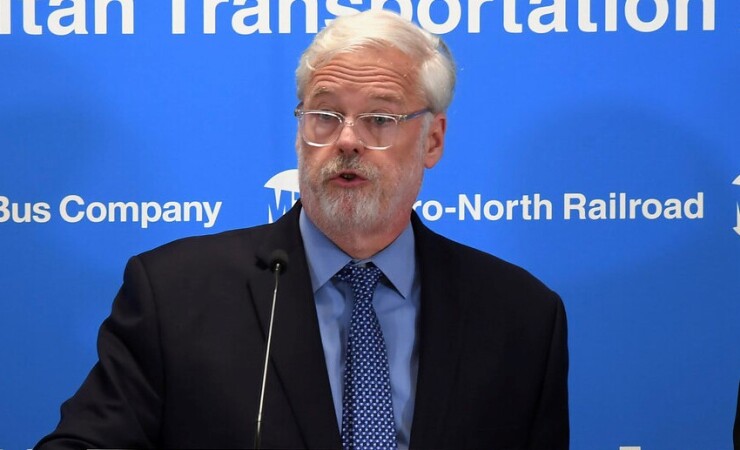A 61-page
The episode marked the latest flashpoint for the state-run authority, one of the largest municipal issuers with roughly $43 billion in debt. The MTA, which operates mass transit in the New York City region, is facing a financial crisis that includes a projected $1 billion operating deficit by 2022.
“The complete lack of controls and failure to have accountability for overtime, that we found and as is greatly detailed in our report leaves the MTA extremely vulnerable for fraud, waste and abuse,” said Morrison & Foerster LLP partner Carrie Cohen.

The MTA, the authority-commissioned report said, paid more than $1.3 billion in overtime in fiscal 2018, with all operating units except Bridges and Tunnels up from the previous year. Long Island Rail Road accounted for the largest overtime increase, 20%. Overall, spending on overtime has spiked 53% over five years.
According to Cohen, the investigation focused on policies only and drew no conclusion about whether overtime is justified or fraudulent.
Still, sparks flew again between Lawrence Schwartz and John Samuelsen in what seemed like a rerun of a similar public dustup three months earlier when Schwartz called for an independent prosecutor following a report by Albany think tank
Schwartz is the finance committee chairman and Gov. Andrew Cuomo's former chief of staff. Samuelsen, a nonvoting board member, is international president of the Transport Workers Union.
Samuelsen accused Schwartz of "ranting and raving [on CBS News] in an inappropriate, hyperbolic manner about fraud and abuse among transit workers." He also chided Morrison & Foerster for not investigating overtime among personnel at MTA headquarters. "Why wouldn't you investigate MTA headquarters, when MTA headquarters is a very likely place where fraud and corruption exists?"
“That's not true, John," Schwartz retorted. "Read the transcript and watch the segment. You never watched it. If you’d read it, you’d know what you just said was a lie.”
The report said few employees at the MTA's Lower Manhattan headquarters are overtime-eligible.
Samuelsen said initiatives such as the Subway Action Plan and Fast Forward, combined with a hiring freeze prompted the overtime increase. "Everybody around here knows why the overtime went up," Samuelsen added. "It was not new ground, it was laid out by the agency presidents that this overtime was necessary to get the system into a state of good repair."

"There’s blood on your hands because transit workers were assaulted in the aftermath of your accusations about rampant fraud, which you still have not produced a lick of evidence about," Samuelsen told Schwartz.
Many MTA union agreements are up for renewal. At the same time, the authority is developing a reorganization plan, crafted by AlixPartners LLP, that according to Chairman Patrick Foye leaves the authority with "hundreds and hundreds of decisions."
"The MTA realizes it needs to sign pretty tough contracts with the unions, but the AlixPartners report just kinds of punts on that," said Nicole Gelinas, a senior fellow with the Manhattan Institute for Policy Research. "They don't lay out any number that they're trying to reach with the union cost savings. They're sort of leaving that up to the MTA."
Morrison & Foerster issued 15 recommendations, including tighter work rules, a review of the hiring freeze and a centralized repository for overtime policies.
Foye said the authority has already begun implementing some of Morrison & Foerster's 15 recommendations, notably the use of Kronos biometric time clocks.
“I think the Morrison & Foerster recommendations are valuable and important and the overtime issue, which has been an issue since I joined the board [in April], that focus is going to continue," he told reporters. “The basic message is that we can do better and we have to do better.”
Morrison & Foerster said it contacted the leaders of several of the largest unions representing MTA employees and offered to meet with them, but none responded.

The firm said it interviewed more than 70 persons across MTA agencies and relevant external organizations; reviewed thousands of pages of MTA documents collected from the MTA; and analyzed studies by the MTA inspector general's office; the state comptroller's office and the MTA board's audit committee.
It said it also researched best practices for major urban transit authorities and reviewed media coverage.
According to Moody's Investors Service, rising income inequality in the region will make it more difficult for the MTA to raise fares to balance its budget. Still, Moody's said, stronger income growth among high-earning residents has boosted the region's overall resources to subsidize transit operations.
Had the MTA's dedicated tax revenues paralleled the region's personal income growth over the past five years, said Moody's, the subsidy level would have been $800 million more in fiscal 2019.





